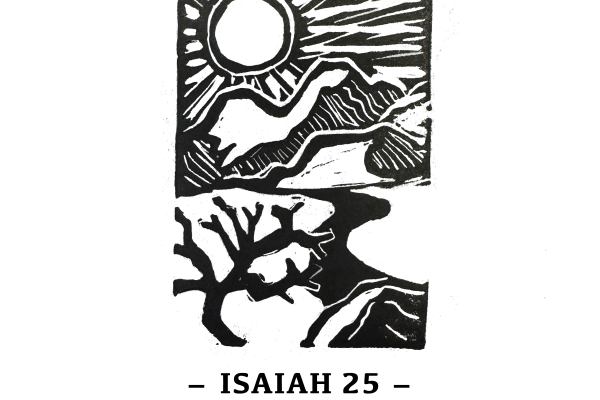
Second Monday of Advent: Death's End
On this mountain he will destroy
the shroud that enfolds all peoples,
the sheet that covers all nations;
he will swallow up death forever.
The Sovereign Lord will wipe away the tears
from all faces;
he will remove his people’s disgrace
from all the earth.
The Lord has spoken.
—Isaiah 25:7-8
After a painful day of recuperating from yet another surgery, I found myself awake at two in the morning, staring into the darkness. I could hear what had become, after a lifetime of being in and out of hospitals, the familiar late-night sounds—the medical machines beeping from rooms down the hallway and the occasional scuffling of a nurse’s shoes past my door.
And I began to cry.
The darkness of the hospital room echoed my emotions. Why have I suffered so much throughout my life?
I am not always this blue. I like being the life of the party, always joking around with people. I love to rock out at concerts with friends, go on trips with my family, and hike in the mountains with my wife. This life is filled with joy and delight.
But this life has also been filled with pain and grief. Death always seems to be creeping around, ready to snatch me away.
Lying there in the dark, I became overwhelmed by the story of my medical woes.
At the age of five, I nearly died from a congenital defect affecting my kidneys. My childhood was 13 years in and out of the hospital for surgeries to fix various issues.
In my forties, I felt like someone had thrown a spear into my back. It was my aorta tearing. I found out later that very few people survive an aortic dissection. After emergency surgery, I was in a coma for four weeks. Two months later, I was life-flighted to a heart hospital because the aortic aneurysm came back. I had to have two open-heart surgeries in the same year!
Then, a few years later, after several days of debilitating abdominal pain, I had to call an ambulance. After several more days in the hospital writhing in pain, they informed me that my colon had become ischemic, threatening to kill me. They had to take the drastic step of removing it.
Last year, I experienced a life-threatening case of Covid. I was in and out of the hospital for three months, including a week in the ICU, barely able to breathe.
That’s a lot.
As I lay there in my dark hospital room with my tears dripping into my ears, it occurred to me that if I lived in biblical times, I would have been dead several times over from any of these ailments.
How horrible it must have been in the ancient world. The infant mortality rate was incredible, and many mothers died as they gave birth. A large percentage of people did not live into adulthood. People would die all the time, and nobody had any idea why.
“Hey, Keziah, what happened to Abihu?”
“I don’t know. One day, he just fell over and died.”
Sons and daughters died. Spouses died. Friends died. It was a real time of darkness. People died. All. The. Time.
And still, they had hope. Their prophets told them that one day, God would lift the shroud of darkness, and death would be defeated.
When Jesus raised Lazarus from the dead, Mary, Martha, and all their friends must have been elated beyond measure. Wait, WHAT? Death can be defeated? Thank you, Lord!
I imagined myself in Martha's sandals. Jesus looked into her tear-filled eyes while she was in the darkness of grief over the death of her brother Lazarus and said to her,
“I am the resurrection and the life. The one who believes in me will live, even though they die… Do you believe this?” (John 11:25–26)
This is not an easy thing to believe.
The pain and grief of this dark world can be so overwhelming. I laid in that hospital bed, having just been released from the ICU yet again, having experienced another round of excruciating pain. Amid this kind of hardship, I just want to succumb to my anguish. And I’m sure those in Jesus’ day wanted to do the same.
But when Jesus himself was resurrected from the dead, it invigorated his first disciples to fearlessly share the good news. It gave them and anyone in Christ the assurance of resurrection themselves!
The reality of resurrection is not just a tiny morsel of hope in a world overflowing with grief. It is the ultimate hope, the ultimate remedy for all our afflictions, misery, and mourning.
In that dark hospital room, Jesus was asking me if I believed that he is the resurrection and the life.
And through my tears, I told him, “Yes, I believe!”
—Bob Robinson ministers to students at Kent State University at Stark and Stark State College and is the founder of The Center to Reintegrate Faith, Life, and Vocations.
the shroud that enfolds all peoples,
the sheet that covers all nations;
he will swallow up death forever.
The Sovereign Lord will wipe away the tears
from all faces;
he will remove his people’s disgrace
from all the earth.
The Lord has spoken.
—Isaiah 25:7-8
After a painful day of recuperating from yet another surgery, I found myself awake at two in the morning, staring into the darkness. I could hear what had become, after a lifetime of being in and out of hospitals, the familiar late-night sounds—the medical machines beeping from rooms down the hallway and the occasional scuffling of a nurse’s shoes past my door.
And I began to cry.
The darkness of the hospital room echoed my emotions. Why have I suffered so much throughout my life?
I am not always this blue. I like being the life of the party, always joking around with people. I love to rock out at concerts with friends, go on trips with my family, and hike in the mountains with my wife. This life is filled with joy and delight.
But this life has also been filled with pain and grief. Death always seems to be creeping around, ready to snatch me away.
Lying there in the dark, I became overwhelmed by the story of my medical woes.
At the age of five, I nearly died from a congenital defect affecting my kidneys. My childhood was 13 years in and out of the hospital for surgeries to fix various issues.
In my forties, I felt like someone had thrown a spear into my back. It was my aorta tearing. I found out later that very few people survive an aortic dissection. After emergency surgery, I was in a coma for four weeks. Two months later, I was life-flighted to a heart hospital because the aortic aneurysm came back. I had to have two open-heart surgeries in the same year!
Then, a few years later, after several days of debilitating abdominal pain, I had to call an ambulance. After several more days in the hospital writhing in pain, they informed me that my colon had become ischemic, threatening to kill me. They had to take the drastic step of removing it.
Last year, I experienced a life-threatening case of Covid. I was in and out of the hospital for three months, including a week in the ICU, barely able to breathe.
That’s a lot.
As I lay there in my dark hospital room with my tears dripping into my ears, it occurred to me that if I lived in biblical times, I would have been dead several times over from any of these ailments.
How horrible it must have been in the ancient world. The infant mortality rate was incredible, and many mothers died as they gave birth. A large percentage of people did not live into adulthood. People would die all the time, and nobody had any idea why.
“Hey, Keziah, what happened to Abihu?”
“I don’t know. One day, he just fell over and died.”
Sons and daughters died. Spouses died. Friends died. It was a real time of darkness. People died. All. The. Time.
And still, they had hope. Their prophets told them that one day, God would lift the shroud of darkness, and death would be defeated.
When Jesus raised Lazarus from the dead, Mary, Martha, and all their friends must have been elated beyond measure. Wait, WHAT? Death can be defeated? Thank you, Lord!
I imagined myself in Martha's sandals. Jesus looked into her tear-filled eyes while she was in the darkness of grief over the death of her brother Lazarus and said to her,
“I am the resurrection and the life. The one who believes in me will live, even though they die… Do you believe this?” (John 11:25–26)
This is not an easy thing to believe.
The pain and grief of this dark world can be so overwhelming. I laid in that hospital bed, having just been released from the ICU yet again, having experienced another round of excruciating pain. Amid this kind of hardship, I just want to succumb to my anguish. And I’m sure those in Jesus’ day wanted to do the same.
But when Jesus himself was resurrected from the dead, it invigorated his first disciples to fearlessly share the good news. It gave them and anyone in Christ the assurance of resurrection themselves!
The reality of resurrection is not just a tiny morsel of hope in a world overflowing with grief. It is the ultimate hope, the ultimate remedy for all our afflictions, misery, and mourning.
In that dark hospital room, Jesus was asking me if I believed that he is the resurrection and the life.
And through my tears, I told him, “Yes, I believe!”
—Bob Robinson ministers to students at Kent State University at Stark and Stark State College and is the founder of The Center to Reintegrate Faith, Life, and Vocations.
